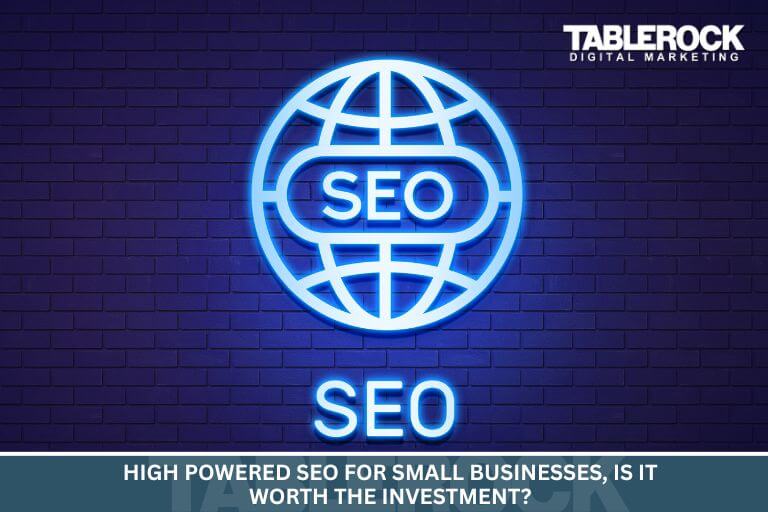Learn easy, jargon-free tactics to boost your Google rankings and attract more customers.
SEO for small businesses is like a neon sign for your website; it lights up your business so hungry customers can’t miss you. Without it, even your best offers stay hidden in plain sight, while competitors steal the spotlight. If you’re not ranking above or near your competitors, you’re handing them customers you didn’t even know you had.
Every day, people type over 3.5 billion searches into Google, seeking services like yours (Technology Magazine). Only the top results get clicks. That means if you’re buried on page two or three, potential customers never get to meet you.
At Table Rock Digital, we know SEO sounds like alphabet soup. But it doesn’t have to be mysterious. SEO for small businesses involves making minor tweaks to ensure your site appears in search results when people search for what you offer, without confusing jargon – just clear steps that bring more visitors through your digital door.

What Is SEO?
SEO stands for Search Engine Optimization. It’s the practice of optimizing your website’s content and structure to improve its ranking with Google and other search engines. There are three main parts:
- On-Page SEO: Optimizing text, images, and HTML elements on your pages.
- Off-Page SEO: Earning links and mentions from other reputable sites.
- Technical SEO: Making sure your site loads fast, is secure, and works on mobile devices.
Think of on-page SEO as decorating your store window. Off-page SEO is getting word-of-mouth referrals from neighbors. Technical SEO is ensuring your shop door opens smoothly and doesn’t creak.
Why SEO Matters for Your Business
Getting found on Google is like having a 24/7 salesperson at your disposal. You don’t pay per click, and your site continues to work while you sleep. Before we look at the perks, let’s cover why being on page one matters:
- Increased Visibility: Appear at the exact moment someone searches for your service.
- Qualified Leads: Visitors arrive ready to make a purchase or inquire.
- Trust & Credibility: High rankings signal you’re an industry leader.
- Long-Term ROI: Organic traffic keeps flowing without extra ad spend.
If your competitors are ranking and you’re not, they’re capturing leads and sales that could be yours. Simple as that.
Want to Know More About SEO for Small Businesses?
Why It Beats Other Channels
Unlike paid ads that disappear when budgets dry up, SEO builds lasting value. It’s cost-effective growth: once you rank, you continue to receive traffic without ongoing fees. Perfect for small businesses with tight marketing budgets.
Benefits of SEO for Small Businesses
SEO offers measurable ways to grow without breaking the bank. Here’s a quick overview of the core benefits:
| Benefit | What It Means for You |
| Increased Visibility | More eyes on your site without ongoing ad costs. |
| Better Lead Quality | Visitors arrive to buy or inquire. |
| Cost-Effective Growth | No pay-per-click fees for organic traffic. |
| Competitive Advantage | Outrank rivals and capture market share. |
| Long-Term Results | Rankings last beyond a single campaign. |
This table illustrates why SEO for small businesses is one of the most strategic investments you can make. Think of it as building equity in your online storefront.
How to Get Started with SEO: Simple Steps
Getting started doesn’t require a tech degree or a huge budget. Follow these six straightforward steps to get more eyes on your site and more customers in the door:
- Keyword Snapshot: List 3–5 phrases your customers use when searching, like “emergency plumber near me.” Use Google’s autocomplete or free tools to find ideas.
- On-Page Basics: Add those keywords to page titles, headings, and image alt text. Keep titles under 60 characters and align them with search intent.
- Quality Content: Write helpful pages or blog posts that answer your customers’ biggest questions. Aim for 500–1,000 words with subheads, bullet lists, and clear language.
- Technical Check: Test site speed with PageSpeed Insights. Compress images, enable browser caching, and switch to HTTPS if you haven’t yet.
- Local Focus: Small Businesses Win Local Searches. Include your city or region in titles and content. Claim and optimize your Google Business Profile with accurate information.
- Link Building: Reach out to local partners, suppliers, or associations to request mentions or guest posts. Each link is a vote of confidence for Google.
Starting small and staying consistent compounds these efforts into real business growth.
Competitor Catch-Up: Don’t Let Them Win
If you’re not on page one, competitors are getting your leads. Use this quick checklist to see where you stand and how to close the gap:
- Search Your Main Keyword
Type your top keyword into Google. Which businesses show up first? - Analyze Their Content
Click the top five results. Note their headlines, visuals, and offers. What makes them stand out? - Spot Opportunities
Look for gaps, missing FAQs, no testimonials, or slow page loads. Those are your chances to shine. - Action Plan
Update your pages to fill those gaps, then track changes in rankings with an SEO tool.
Peeking at competitors is like checking a neighbor’s store windows. Discover what catches customers’ eyes, then surpass it with your unique offerings.
Frequently Asked Questions
Still have questions? Here are common answers about SEO for small businesses:
How much does SEO cost?
Small audits typically start at around $500–$ 1,000. If you sign a monthly plan with us, we will refund you this cost. Monthly plans to scale usually range from $700 to $3,000, depending on goals and market size.
How long until I see results?
Patience is key. You’ll see initial lifts in 2–3 months for low-competition terms, and 6–9 months in tougher markets.
Can I DIY SEO?
You can tackle basic keywords, titles, and simple content updates. For more effective results, professional help accelerates the process and avoids common pitfalls. You can also receive coaching with our SEO Consulting Services.
Is SEO better than paid ads?
They work best together. SEO delivers lasting visibility, while ads drive immediate traffic. A balanced approach maximizes reach and ROI.
What if I have multiple locations?
Create separate pages and Google Business Profiles for each location. Tailor content and keywords to each area you serve.
How often should I update my content?
Fresh content keeps you relevant. Aim to add or update a page or blog post every 4–6 weeks.
Ready to Capture More Customers?
Investing in SEO for small businesses means more visibility, higher-quality leads, and real growth. Don’t let competitors waltz ahead, take control of your search rankings.
Our Proven SEO Services team at Table Rock Digital turns searches into customers with no jargon, just results. Contact us today for a complimentary SEO snapshot and discover your current standing.
